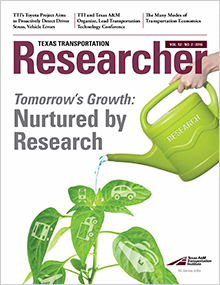A system that supports the efficient movement of cars, trucks, aircraft, trains and ships — and the people and goods on board — is central to any economy. That’s a given. But what’s less clear is how (and to what degree) Texas’ transportation system is important to various industry sectors. A Transportation Policy Research Center (PRC)–sponsored study at the Texas A&M Transportation Institute (TTI) intends to answer those questions. Chris Simek and Matt Miller, both assistant research scientists in TTI’s Public Engagement and Mobility Management programs, respectively, are co-leading the project.

The researchers conducted more than 20 interviews with economic developers, professional site selectors and private industry professionals regarding factors that influence facility location or relocation decisions. They found that three factors tend to rise to the top of the list: skilled workforce availability, access to adequate production materials and transportation infrastructure.
“It’s like a three-legged stool,” Simek says. “While various industry sectors may place varying degrees of importance on each leg, if any leg is deficient, your ability to recruit new businesses to your region or get existing businesses to expand is significantly inhibited.”
The information and computer technology sector, for instance, may be concerned primarily with access to skilled labor. A lot of those workers place a premium on quality-of-life issues, one of which is access to multiple transportation options in their daily commute. So if a city doesn’t have a robust public transit system, that city might lose out when a large tech employer is looking for a new home.
Another example is the advanced semiconductor manufacturing industry (think silicon wafers), which uses large amounts of water in its production processes. “Lack of a dependable and inexpensive supply of water could be a significant red flag,” Miller says, “even if the region is attractive because it has a great workforce and excellent transportation infrastructure.”
And, for the energy sector, reliable transportation infrastructure that provides access to oil and gas sites in a specific shale region is important.
What researchers are learning has direct consequences for a state that’s a major worldwide economic player. According to the Texas Comptroller of Public Accounts, the state’s economy is bigger than those of Australia and Mexico, and it rivals those of Russia and Canada. Texas is also the nation’s number-one exporting state and has been for more than a decade.
Committees of the Texas Legislature routinely consider policies that affect business interests throughout the state. These may include workplace issues and employment practices, as well as infrastructure development matters, and related policy actions can have both immediate and lasting implications for the state’s economy.
“The issues and decisions confronting our legislators can have powerful impacts on the full range of industries in Texas,” says Ginger Goodin, PRC director. “Through the work we’re doing now, we hope to give policy makers more of what they need to inform those decisions.”
